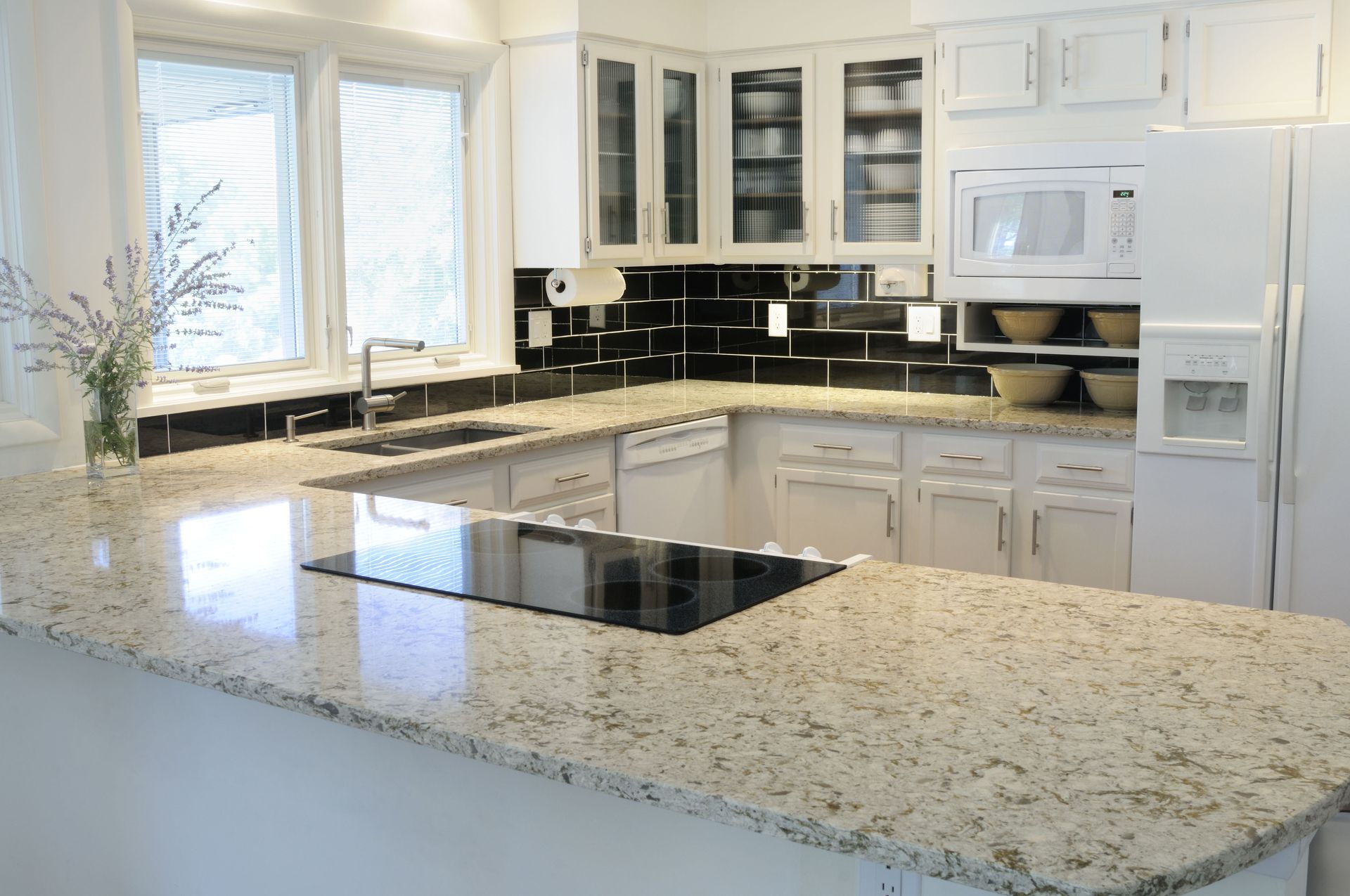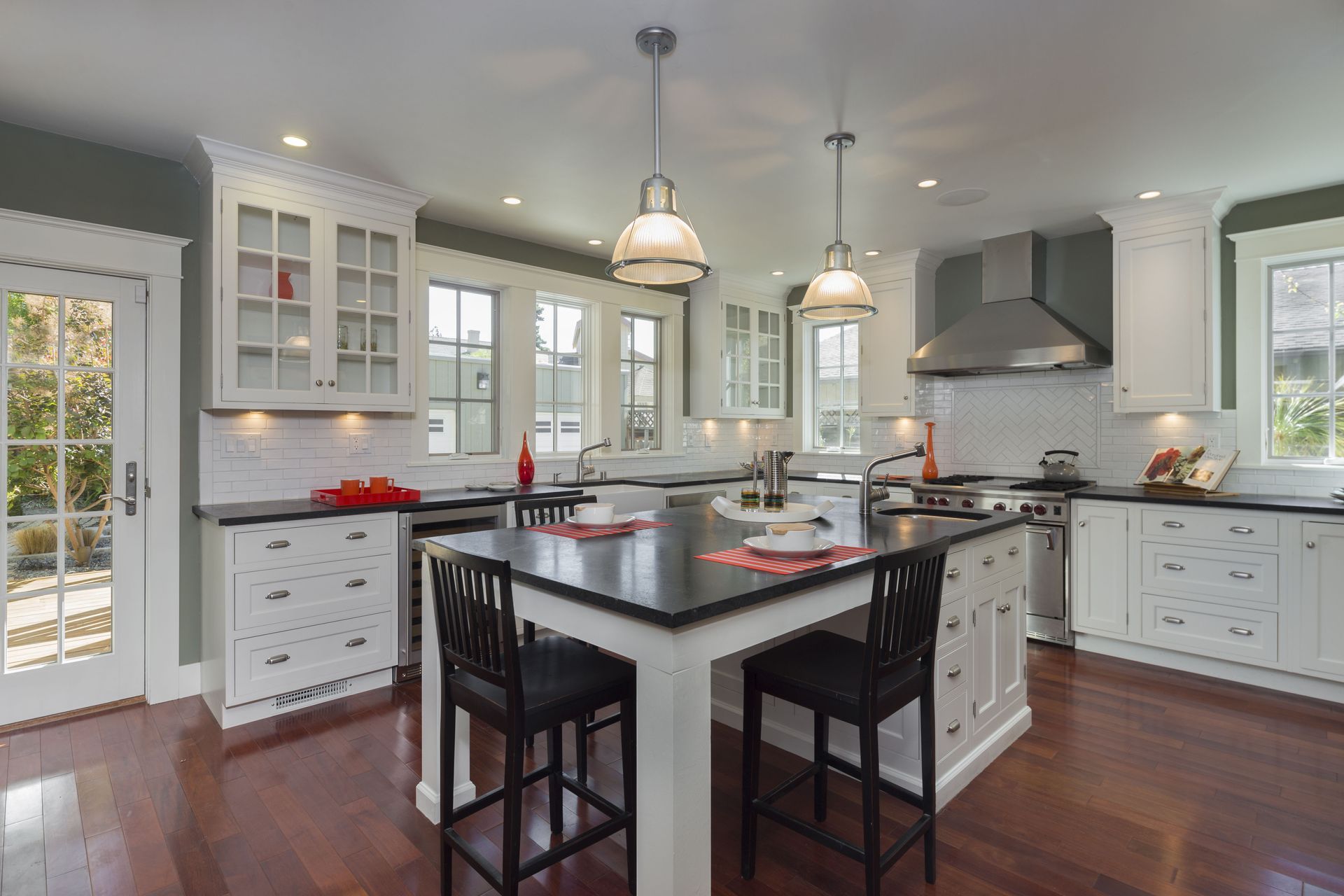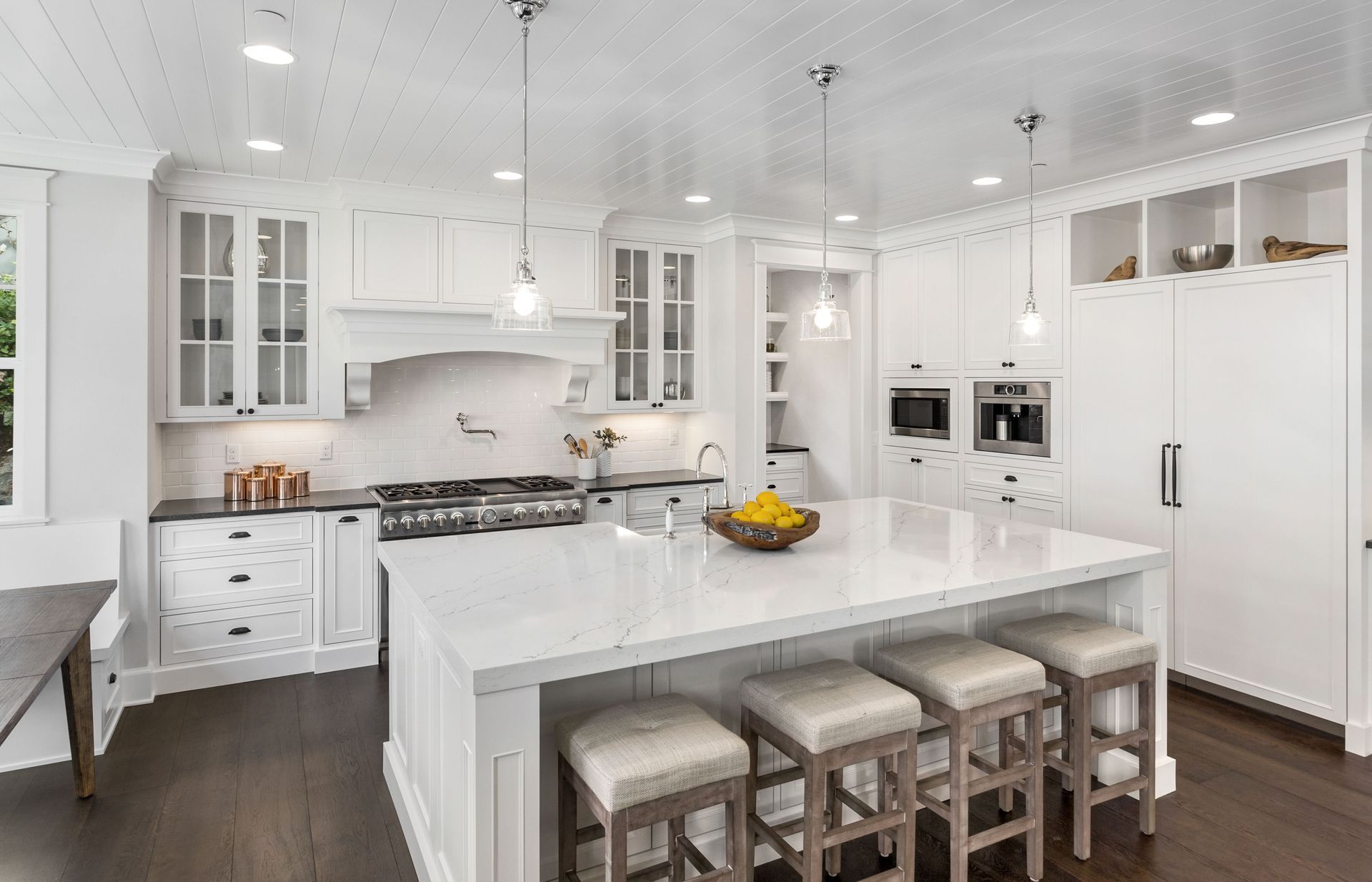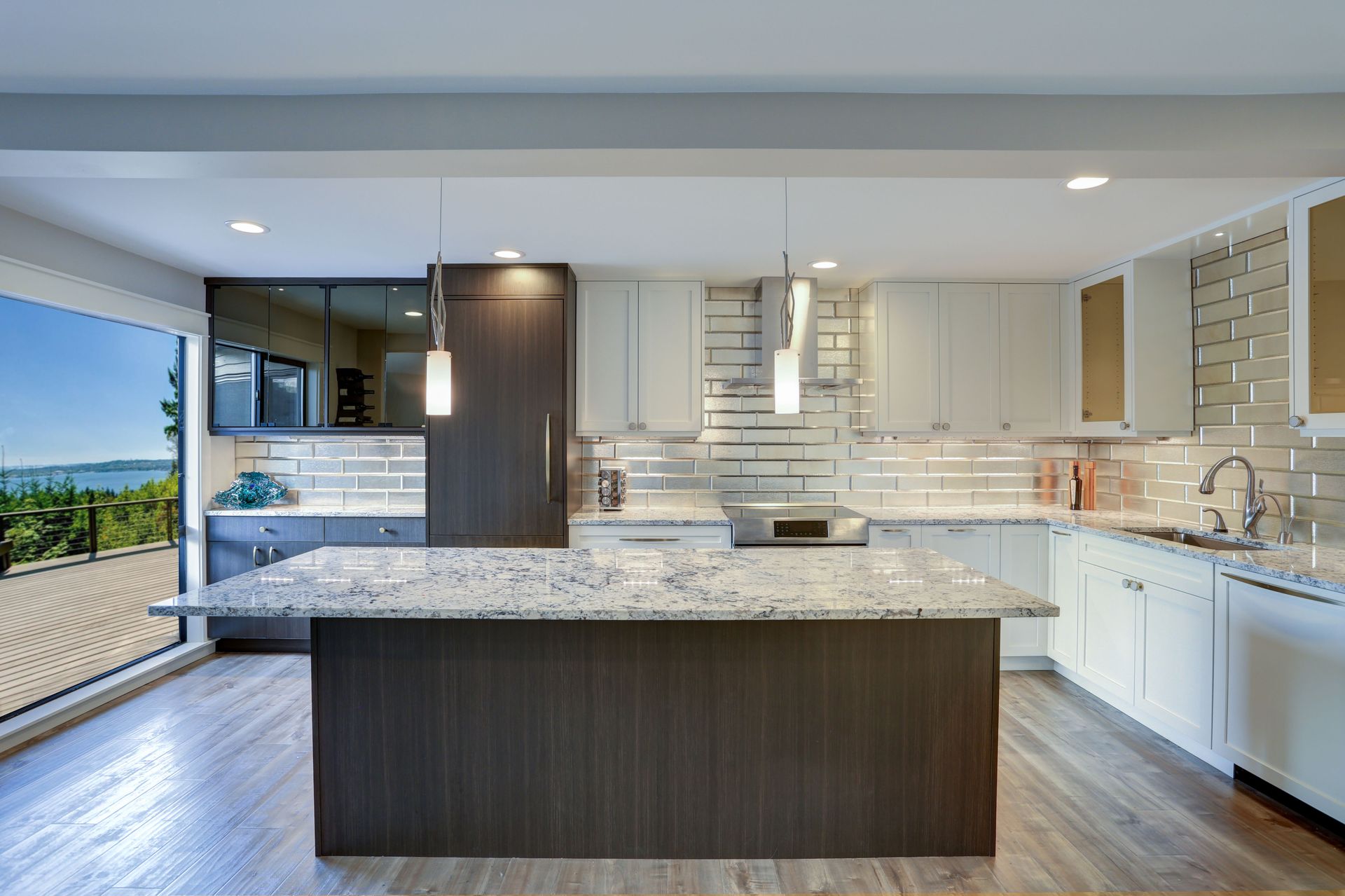October 1, 2025
Choosing the right countertop material for your kitchen is a significant decision, with quartz and marble being two of the most popular options. Each has distinctive features that make them appealing for different reasons. In this article, we explore these two materials, examining their pros and cons to help you decide which is best suited for your culinary space. This in-depth comparison will cover various factors including durability, maintenance, cost, and aesthetic appeal. Ultimately, personal preference and practical considerations will guide your choice, ensuring the countertop meets both your design vision and functional needs. Partnering with the right countertop company can also make this decision easier, as they can provide expert guidance and installation services tailored to your project.
Composition and Appearance
Quartz: Engineered Composition Quartz countertops are crafted from engineered stone, comprising about 90-95% natural quartz crystals combined with resins and pigments. This manufacturing process allows for a broad range of colors and patterns, making quartz highly customizable. The result is a non-porous surface that resists staining and offers uniformity in appearance. Quartz delivers a balance of durability and style, making it a versatile choice for modern homeowners. Given its non-porous nature, quartz provides a hygienic surface, advantageous for busy kitchens.
Marble: Natural Formation Marble is a natural stone formed through the metamorphism of limestone, resulting in its signature veining patterns. These patterns, unique to each slab, contribute to marble's timeless and luxurious appeal. Marble surfaces offer a classic look with stunning aesthetics, perfect for anyone desiring a traditional or opulent kitchen design. While naturally beautiful, the stone's porosity requires careful maintenance to preserve its appearance. Many homeowners rely on an experienced countertop company to source the most visually appealing marble slabs for their projects.
Color Variability The color options available for quartz countertops are vast, largely due to controlled manufacturing processes that incorporate pigments. From vivid hues to more subdued tones, quartz can be tailored to fit any design scheme. Marble, on the other hand, offers a palette that is more limited but striking, found in shades of white, gray, green, and black. These choices significantly influence kitchen aesthetics, allowing homeowners to select a countertop that either blends seamlessly or creates contrast with cabinetry and fixtures.
Pattern and Texture Quartz countertops are available in a variety of patterns, often designed to mimic the beauty of natural stones like marble, without the maintenance challenges. The engineered process ensures consistency, giving a uniform appearance across slabs. Marble's veining, however, is naturally occurring and unique to each piece, adding character and individuality to a kitchen. Quartz surfaces are generally smoother, while marble may possess a more organic feel, making pattern and texture a key factor in final selection.
Longevity of Style Marble has been used for centuries, making it a timeless option that rarely goes out of style. Its enduring beauty means it remains fashionable regardless of shifting trends. Quartz, meanwhile, offers the flexibility to adapt to contemporary styles, as manufacturers regularly introduce new colors and finishes. Whether you prefer a timeless classic or a trendy modern look, both quartz and marble can complement long-term design goals when installed by a skilled countertop company.
Durability and Maintenance
Scratch Resistance One of the most important considerations when selecting a countertop is scratch resistance. According to Bob Vila, quartz has a ranking of seven in hardness on the Moh's scale (developed in 1822 by Friedrich Moh to rate mineral hardness). Marble ranks only at a three. This demonstrates that quartz is significantly more resistant to scratches, making it a better choice for high-traffic kitchens. Marble, while elegant, is softer and more prone to etching and nicks over time.
Stain and Etch Resistance & Quartz's non-porous structure provides excellent protection against staining and etching, while marble is more vulnerable to spills and acidic substances. Prompt cleaning and routine sealing are essential for maintaining marble's appearance. Homeowners who want a low-maintenance option often gravitate toward quartz, especially when advised by a knowledgeable countertop company that understands long-term durability.
Heat Resistance & Both quartz and marble have moderate heat resistance, but neither is ideal for direct contact with hot pots or pans. Quartz can discolor under extreme heat due to its resin components, while marble may crack under sudden temperature changes. Using trivets and heat pads will help preserve the integrity of both surfaces.
Cleaning and Upkeep Quartz is known for being low-maintenance, requiring only soap and water for cleaning. Marble, however, requires more specialized care, including pH-neutral cleaners and periodic resealing. For busy households, quartz may be the more convenient choice, while marble appeals to those willing to invest extra time in maintenance.
Repair and Restoration Quartz repairs are generally easier and less costly, while marble restoration often requires professional refinishing. Both options can be maintained long-term, but their ease of repair is another factor to weigh when deciding which surface is right for your kitchen.
Cost and Value
Initial Investment Quartz tends to be more budget-friendly, offering a wide range of price points depending on customization. Marble is generally more expensive, reflecting its natural rarity and luxury appeal.
Long-Term Value Quartz often provides higher resale value due to its durability and easy maintenance, while marble's classic beauty appeals to buyers who value luxury and design tradition.
Cost of Maintenance Over time, quartz usually incurs fewer maintenance costs compared to marble, which requires resealing and more frequent upkeep.
Availability and Sourcing Quartz is widely manufactured, making it consistently available, while marble must be sourced from quarries, sometimes resulting in longer lead times or higher costs.
Environmental Impact Quartz manufacturing produces less waste compared to quarrying marble, but both have environmental considerations. Choosing an eco-conscious countertop company can help minimize the footprint of your project.
Installation Considerations
Weight and Structural Support Both quartz and marble are heavy materials that require sturdy cabinetry and skilled installation. A reputable countertop company will ensure your kitchen is structurally prepared.
Seam Visibility Quartz allows for cleaner seams thanks to engineered consistency, while marble seams may be more visible due to irregular veining.
Installation Timeframe Quartz generally has faster turnaround times, while marble may require longer sourcing and fabrication.
Expertise Required Both materials require professional installation, but marble's natural veining and brittleness make it especially important to hire experienced installers.
Customizability Quartz offers broader customization in color and pattern, while marble's uniqueness comes from its one-of-a-kind veining. Both can achieve high-end, custom designs when managed by a skilled countertop company.
Design Trends and Compatibility
Current Design Trends Quartz appeals to contemporary and minimalist trends, while marble retains popularity in traditional and luxury kitchen designs.
Versatility in Kitchen Styles Quartz adapts easily to many styles, while marble enhances spaces that lean toward classic elegance.
Pairing with Cabinetry Quartz's versatility pairs well with any cabinetry finish, while marble's veining often looks stunning against simple or neutral cabinets.
Backsplash and Accents Coordination Quartz can coordinate seamlessly with modern backsplash designs, while marble pairs beautifully with tile and metal accents.
Influence of Personal Style Ultimately, your choice reflects personal style quartz for practical versatility, marble for timeless beauty.
Health and Safety
Non-Porous vs. Porous Surfaces Quartz's non-porous surface resists bacteria and makes it a hygienic option, while marble's porosity requires sealing to prevent contamination.
Avoiding Allergens Quartz minimizes allergen buildup with its smooth surface, making it a great option for households with sensitivities.
Impact of Sealing Quartz does not require sealing, while marble must be regularly sealed to maintain its safety and appearance.
Radon Emission Concerns Both quartz and marble are generally safe, but selecting materials from a trusted countertop company ensures compliance with safety standards.
Safe Cleaning Methods Quartz tolerates mild cleaners, while marble needs specialized products to avoid etching and staining.
When choosing between quartz and marble countertops, it's critical to weigh style preferences alongside durability, maintenance, cost, and installation considerations. Quartz offers strength, low maintenance, and modern adaptability, while marble provides timeless beauty and unmatched elegance. Both materials can elevate your kitchen, but the right choice depends on your lifestyle and priorities. To make the best decision, consult with a trusted countertop company that understands both the technical and aesthetic aspects of these materials. For expert advice and professional installation, contact International Marble & Granite Enterprises Inc. today and transform your kitchen with the perfect countertop solution.


















